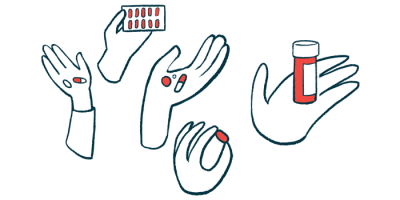Orelabrutinib reduces brain lesions in RRMS by 90% in Phase 2 trial
InnoCare oral therapy shows promise to slow MS in 12-week analysis
Written by |

Treatment with InnoCare Pharma’s orelabrutinib — an experimental inhibitor of the Bruton’s tyrosine kinase (BTK) enzyme — led to significant reductions in new active brain lesions among people with relapsing-remitting multiple sclerosis (RRMS).
That’s according to the results of a 12-week interim analysis of a global Phase 2 trial testing orelabrutinib’s safety and effectiveness for multiple sclerosis (MS).
“The primary objective of detecting significant reduction in cumulative number of new [brain] lesions at week 12 compared to placebo was met in all three active treatment groups,” InnoCare said in a company press release outlining its business highlights from last year.
That finding means the trial has met its main goal, overall “supporting further development” of orelabrutinib for MS, the company noted.
A full, 24-week data readout from the trial and plans for a Phase 3 study are expected within the coming year, InnoCare announced in its 2022 annual results presentation.
12-week trial results support development of orelabrutinib for MS
Orelabrutinib is an oral small molecule that targets BTK, an enzyme important for the activation of immune cell populations implicated in MS, namely B-cells and macrophages.
B-cells are the circulating immune cells responsible for producing antibodies, including the self-reactive ones that drive MS. Macrophages give rise to microglia, the brain-resident immune cells whose activation is thought to contribute to the neurodegenerative disease.
By preventing their activation, orelabrutinib is expected to ease inflammation and slow MS progression.
A number of other BTK inhibitors are being investigated in MS — including Sanofi’s tolebrutinib, Merck KGaA’s evobrutinib, and Genentech’s fenebrutinib — but InnoCare believes orelabrutinib may have some advantages over the other inhibitors.
For example, orelabrutinib seems to be more selective for BTK, with more than 90% inhibition of the enzyme and no blocking of other similar enzymes. It also has a favorable pharmacological profile and seems to bind to a greater proportion of BTK enzymes in the blood than other similar inhibitors. This could allow the medication to be given once per day at low doses.
Moreover, orelabrutinib is able to cross the selective barrier that separates the brain from the bloodstream, and thereby enter readily into brain tissue.
The company believes these properties will make for a BTK inhibitor with improved safety and high efficacy — and is now pointing to the positive results of its trial analysis.
The Phase 2 trial (NCT04711148) was launched in 2021 and involves 160 adults with RRMS, ages 18-55, who had at least one relapse in the two years before their screening for this study.
Participants were recruited at sites in the U.S., China, Poland, and Ukraine. Each was randomly assigned to receive a placebo or one of three doses of orelabrutinib — 50 mg once daily, 50 mg twice daily, or 80 mg once daily.
Those on orelabrutinib received their assigned dose for 24 weeks (about six months), while placebo-treated patients switched to the 50 mg once-daily dose after 12 weeks, or about three months.
After completing the main trial, participants may enter an open-label extension phase, in which all will receive orelabrutinib for two years. This will allow a total of 120 weeks of treatment (27 months) for those originally given orelabrutinib.
The trial’s main goal is to assess the number of new brain lesions with active inflammation after 12 weeks. Secondary goals include safety and relapse rates after 120 weeks.
Now, an interim analysis conducted at the 12-weeks mark found that orelabrutinib led to significant, dose-dependent reductions in lesion burden compared with a placebo. Specifically, patients given a single 50 mg daily dose experienced a 71.1% relative reduction in lesions, while those given two 50 mg doses experienced an 80.8% reduction.
The greatest relative drop was seen in those given the 80 mg daily dose, with these participants developing 92.1% fewer new lesions than those on a placebo.
The primary objective of detecting significant reduction in cumulative number of new [brain] lesions at week 12 compared to placebo was met in all three active treatment groups.
That profile makes orelabrutinib a potential best-in-class therapy, according to InnoCare. By comparison, the company reported, tolebrutinib (60 mg daily) led to an 85% reduction in active lesions after 12 weeks in a clinical trial, whereas evobrutinib (75 mg daily) led to a 70% reduction.
The experimental treatment also compared favorably with other MS therapies that have a different mechanism of action — though, given that the design of each clinical trial is different, direct comparisons cannot be made.
Orelabrutinib also is being investigated for other autoimmune conditions including systemic lupus erythematosus and neuromyelitis optica spectrum disorder, as well as B cell-associated cancers.
It was approved in China for certain types of cancer in 2020.



